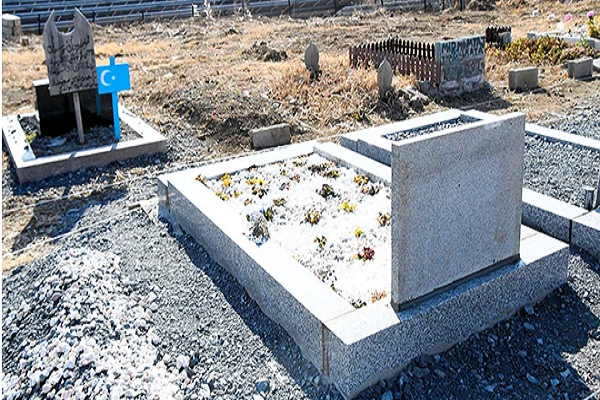Japan Muslims Face Difficulties Burying Dead

An estimated 230,000 Muslims were living in Japan as of the end of 2020, according to Hirofumi Tanada, professor emeritus of sociology at Waseda University.
But only seven cemeteries in Japan accept burials of Muslims.
The entire Kyushu region has none, despite the efforts of the Beppu Muslim Association in Beppu, Oita Prefecture, on the southern main island.
The association planned to open a cemetery for Muslim burials in the city known for its “onsen” hot spring resorts. However, local residents objected.
The group then submitted a petition to the health ministry in June last year, asking it to open “multicultural cemeteries,” where people can be buried based on their religion or for other reasons.
“For Muslims, cremation is disrespectful for the dead,” said Khan Muhammad Tahir, head of the association and professor of communication network engineering at Ritsumeikan Asia Pacific University. “The idea of burning dead bodies feels more painful and distressful than punching them.”
Tahir said Muslims face huge problems if there is no local cemetery that will accept their burials.
He said that transporting bodies to faraway places in Japan or even abroad is technically difficult and expensive.
Many Muslims have lived in Japan for decades and are fully settled in the country.
Tahir, for example, is a naturalized Japanese citizen with a family in Japan.
He said that for himself and other long-term Muslim residents in Japan, being transported to their home countries after they die is not a realistic option.
There are also Japanese Muslims who plan to be buried in their home country of Japan.
One cemetery in Japan that accept burials of Muslims is Honjo Kodama Seichi Reien (Honjo Kodama Cemetery) in Honjo, Saitama Prefecture.
The cemetery has 42 graves, some featuring white tombstones inscribed with Arabic text. Some graves are just mounds without tombstones.
“The people buried here were of different nationalities and had various levels of wealth,” said Sosuke Hayakawa, 75, manager of the cemetery. “The graves look different from each other for those reasons.”
The cemetery started accepting burials of Muslims in June 2019. The first Muslim buried here was a Ghanaian who resided in Soka, Saitama Prefecture.
Since then, Muslims of various nationalities have been buried in the cemetery, according to its records. They include Pakistanis, Bangladeshis, Sri Lankans, Iranians, South Africans, Chinese, Saudis, and Indonesians.
The records also showed the name of a Japanese woman, who was probably married to a Muslim man.
Hayakawa has observed many burials at the cemetery.
Recently, a 10-year-old Bangladeshi child who grew up in Japan was buried here.
“The child’s father was crying when he closed the casket’s lid. He then remained inside the burial hole and didn’t get out for some time,” Hayakawa said.
The tradition of burying bodies was continuing in nearby areas before Hayakawa opened the cemetery in 1995.
At that time, an official from a local public health center asked him if he wanted permission to open the cemetery as one that accepts burials.
This question prompted his decision to accept burials in all areas of the cemetery, spanning 56,200 square meters.
But he received no burial request for many years after opening the cemetery.
In addition, a consumer trend gained momentum for “closing” graves, in which the tombstone is removed and the right to use the land plot is returned to the cemetery.
Hayakawa was struggling financially when a manager of a mosque in Tokyo asked him if his cemetery could accept burials of Muslims.
Hayakawa was happy with the request because he could finally put to use the permission he received to accept burials.
He also needed the income to maintain and preserve the existing graves at the cemetery.
Since then, Hayakawa has continuously received requests for burials from Muslims living in Japan, thanks to word-of-mouth information about the cemetery.
The number of such requests has increased by more than 15 every year.
Hayakawa didn’t feel hesitant about marketing his burial services because burials were customary in Japan when he was a child.
His grandmother and his older sister who died 30 years ago were both buried.
“Buddhists or Muslims, our feeling to mourn for the dead is the same. It’s just that there are various religions that are more suitable for eras or regions, I guess,” Hayakawa said.
BURIALS WERE THE NORM
According to the Cremation Society of Great Britain, 99.97 percent of the dead in Japan in 2019 were cremated. This is far higher than 39.01 percent in France, 30.68 percent in Italy and 54.58 percent in the United States. In South Korea, the ratio was 88.01 percent.
However, burials were once the norm in Japan.
“In the olden days in Japan, when someone died, we used to say euphemistically, ‘Return the dead to mountains,’ or ‘Dead people return to soil,’” said Shigeyuki Takahashi, a journalist who has written many books on topics related to death or mourning.
Takahashi believes that burials gradually lost popularity in Japan partly because of the increase in crematoriums, as well as a social improvement movement pushed by the government and private parties in the 20th century to modernize Japanese lifestyles.
He said the number of burials dramatically decreased after the start of the Heisei Era (1989-2019).
Source: asahi.com



